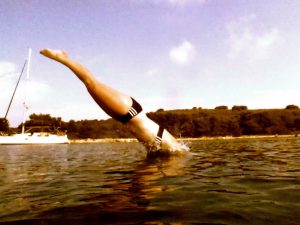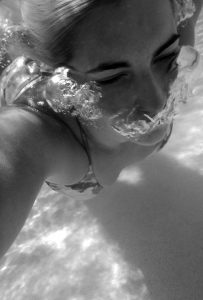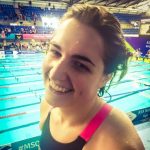“I’m not sure I’m going to come out of the other side of this.
I’m not sure I can either. But until we are sure, I think we should keep coming into work.”
~ The West Wing, “The Midterms” Aaron Sorkin.
 Today a friend sent me a message suggesting that I needed to seriously consider “whether you want to do it (swimming) so much/believe in it so much that you’re happy to give up the other things that life offers to pursue it” because “it really is a way of life as well as a job.” And I understand what she is saying. She sees me going to bed early or turning down an exciting social invitation for the sake of recovery and it alarms her. But there is no reason for this alarm. I am making these choices for myself, for my mental, emotional and physical health not for swimming. Wanting to excel at swimming perhaps provides added motivation to look after myself but it isn’t the reason to do it. The reason to continually attend to recovery is because it will lead to a happy and fulfilling life.
Today a friend sent me a message suggesting that I needed to seriously consider “whether you want to do it (swimming) so much/believe in it so much that you’re happy to give up the other things that life offers to pursue it” because “it really is a way of life as well as a job.” And I understand what she is saying. She sees me going to bed early or turning down an exciting social invitation for the sake of recovery and it alarms her. But there is no reason for this alarm. I am making these choices for myself, for my mental, emotional and physical health not for swimming. Wanting to excel at swimming perhaps provides added motivation to look after myself but it isn’t the reason to do it. The reason to continually attend to recovery is because it will lead to a happy and fulfilling life.
When I began writing these pieces I set out to try and understand why recovery was such difficult thing to attend to. I now think that it is a large part due to a fundamental misunderstanding in society about what recovery is and pervasive aversion to prioritising our mental and physical health over anything else.
I have never once felt that I have ‘given anything up’ for swimming and if I felt like I was making ‘sacrifices’ then I wouldn’t make them. I believe that it is possible for us to pursue the things we love to a high level in a sustainable and non-damaging way. I agree that many don’t. I agree that the culture of elite sport (and arguably high achievement in any field) is STILL dominated by this attitude that in order to achieve you must neglect other elements of your life and abuse your body, but I don’t believe that there is anything innate to high achievement that means this must be so. To excel we must definitely dedicate a high level of attention and reasonable quantities of time to the thing we are working on but this doesn’t have to be all consuming. I am not interested in doing anything that would mean excluding large areas of life experience or sheltering myself from things that may be challenging or difficult. This is what having recovery at the basis of your program is really about. For me, and I think for many amateurs, creating and then trying to sustain an artificial environment with everything geared up to produce maximum athletic performance is neither possible nor interesting. We know this works, and for a few people it will be their chosen path and lead them to sporting success. But the real interest and perhaps the universal battle of our times, is in trying to lead a diverse and varied life, excelling in many areas, pursuing things we love and are enthused by whilst also functioning as part of society.
I think confusion over this is what renders recovery so difficult. We, varied and unique individuals, follow generic non-personalised training plans, we draw our inspiration from people on completely different paths to us, allow others to tell us what counts as impressive achievement and what doesn’t and then we write ourselves off for falling short. I can give you an infinite list of reasons as to why you ‘can’t afford to recover’ or take a morning off, or recover your injury properly. I’ve tested many out on myself, and indeed, written about them in previous articles. But the fact remains: you require rest. With rest you will flourish and develop and without it you will get nowhere. In a recent International Olympic Committee (IOC) statement it is written that: “illness is […] related to a disturbed balance between psychological stress and recovery.”. There is no way around this fact. The only path to sporting success and high achievement lies in sufficient recovery. It is unadvisable to follow another person’s exercise plan but plain bonkers to follow someone else’s recovery plan. We are all subject to a unique set of physical and emotional stressors every day and our training and recovery programmes must be responsive to this not ignorant.
So often we are running into trouble when it comes to having to recover because our starting point is wrong. Sport is not innately discriminatory. There is no rule that states that a forty-year-old woman with a full-time job cannot excel and continuously improve at her sport, however, if she follows the training programme of a twenty-five-year-old full time male athlete her chances of success are very slim. It seems to me that the majority of issues I have discussed in these articles stem from me having a pre-conceived idea of what training should be and then feeling like I am failing or falling short of that ideal. If we started by creating our training programmes around ourselves rather than following something generic and non-personalised then ‘missing’ a session isn’t even possible, as the sessions would not exist independently from our participation in them. The aforementioned IOC statement also states: “Variation in an athlete’s psychological stressors should guide the prescription of training and/or competition loads” i.e. listen to your body and brain, start by looking at your life and what it demands of you and then create a programme that will flourish in that environment. Let’s stop pretending that there will ever be such a thing as a non-disturbed period of life. Let’s stop planning our training with the assumption that nothing stressful or disruptive is going to happen. Let’s accept the encountering and experiencing of external stress part of the plan, rather than an enemy of it.
 The last six months of recovery have been some of the toughest that I have endured. I have railed against the process like nothing before, resisted and battled and denied. I tried training through injuries, I tried shutting down, hiding and shouting and crying but however much time I dedicated to these techniques I would finish every day in exactly the same position as when I woke up: overtrained with severe back cramp and a pulled hamstring. I was forced to come to terms with recovery because I got myself into a position where rest was my only choice. Even if I had given up on the idea of swimming competitively my back, hamstring and overtraining induced exhaustion needed fixing. There was a period when I thought that swimming would not be a part of my future but the fact that life necessitated that I heal my body kept me ‘coming into work’ and as a result I gave myself time to learn. I was a total recovery denier. I questioned every rest day and every lighter session. I couldn’t believe that recovery would ever work, but six months down the line, my back and hamstring are cured and I am mentally more stable than I ever have been. Actively attending to the recovery process is the only thing that has gotten me here and trust me I tried everything else! So this is what I would say to any one in similar position, anyone doubting the idea that they need so much rest, that giving themselves a break will move them forwards, that they will ever feel better than they do now: Recovery works. Recovery works. Recovery works. Don’t abandon your sport and your body, however untenable and unresolvable your condition feels, however long it drags on for. If you can stay with it for long enough, it will show you the way out.
The last six months of recovery have been some of the toughest that I have endured. I have railed against the process like nothing before, resisted and battled and denied. I tried training through injuries, I tried shutting down, hiding and shouting and crying but however much time I dedicated to these techniques I would finish every day in exactly the same position as when I woke up: overtrained with severe back cramp and a pulled hamstring. I was forced to come to terms with recovery because I got myself into a position where rest was my only choice. Even if I had given up on the idea of swimming competitively my back, hamstring and overtraining induced exhaustion needed fixing. There was a period when I thought that swimming would not be a part of my future but the fact that life necessitated that I heal my body kept me ‘coming into work’ and as a result I gave myself time to learn. I was a total recovery denier. I questioned every rest day and every lighter session. I couldn’t believe that recovery would ever work, but six months down the line, my back and hamstring are cured and I am mentally more stable than I ever have been. Actively attending to the recovery process is the only thing that has gotten me here and trust me I tried everything else! So this is what I would say to any one in similar position, anyone doubting the idea that they need so much rest, that giving themselves a break will move them forwards, that they will ever feel better than they do now: Recovery works. Recovery works. Recovery works. Don’t abandon your sport and your body, however untenable and unresolvable your condition feels, however long it drags on for. If you can stay with it for long enough, it will show you the way out.
You can read Georgina’s full series on ‘Why does it remain so difficult to recover?’ here.
About Georgina
 Georgina is a full-time athlete, sprint-swimmer based in the UK. Born in 1993 in Islington, London she moved in the summer of 1996 to rural Cheshire where she lived until early 2014 when she moved to Moscow. She spent the following two and a half years in Russia and returned to the UK at the end of September 2016.
Georgina is a full-time athlete, sprint-swimmer based in the UK. Born in 1993 in Islington, London she moved in the summer of 1996 to rural Cheshire where she lived until early 2014 when she moved to Moscow. She spent the following two and a half years in Russia and returned to the UK at the end of September 2016.
She is an accomplished all-round athlete having competed in multi-event athletics and alpine ski-racing.
After leaving school with A levels in Maths, Further Maths, Physics, English Literature and Art she began a Civil Engineering MSc course at the University of Bath in England before deferring her course in late 2011 in order to focus her activities on swim sprint racing.
When not training, eating and sleeping Georgina teaches flute, plays the piano and sings in various choirs and ensembles. She is currently involved in the building of a house in Birmingham and continues to study and learn to speak Russian. You can follow Georgina on Twitter or Instagram.
